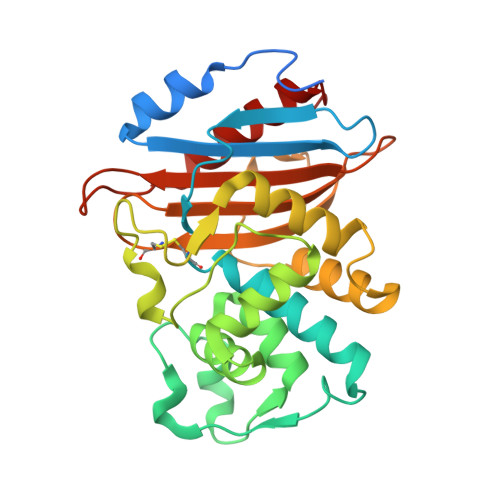KPC-2 beta-lactamase enables carbapenem antibiotic resistance through fast deacylation of the covalent intermediate.
Mehta, S.C., Furey, I.M., Pemberton, O.A., Boragine, D.M., Chen, Y., Palzkill, T.(2020) J Biol Chem 296: 100155-100155
- PubMed: 33273017
- DOI: https://doi.org/10.1074/jbc.RA120.015050
- Primary Citation of Related Structures:
6XD5, 6XD7, 6XJ8 - PubMed Abstract:
Serine active-site β-lactamases hydrolyze β-lactam antibiotics through the formation of a covalent acyl-enzyme intermediate followed by deacylation via an activated water molecule. Carbapenem antibiotics are poorly hydrolyzed by most β-lactamases owing to slow hydrolysis of the acyl-enzyme intermediate. However, the emergence of the KPC-2 carbapenemase has resulted in widespread resistance to these drugs, suggesting it operates more efficiently. Here, we investigated the unusual features of KPC-2 that enable this resistance. We show that KPC-2 has a 20,000-fold increased deacylation rate compared with the common TEM-1 β-lactamase. Furthermore, kinetic analysis of active site alanine mutants indicates that carbapenem hydrolysis is a concerted effort involving multiple residues. Substitution of Asn170 greatly decreases the deacylation rate, but this residue is conserved in both KPC-2 and non-carbapenemase β-lactamases, suggesting it promotes carbapenem hydrolysis only in the context of KPC-2. X-ray structure determination of the N170A enzyme in complex with hydrolyzed imipenem suggests Asn170 may prevent the inactivation of the deacylating water by the 6α-hydroxyethyl substituent of carbapenems. In addition, the Thr235 residue, which interacts with the C3 carboxylate of carbapenems, also contributes strongly to the deacylation reaction. In contrast, mutation of the Arg220 and Thr237 residues decreases the acylation rate and, paradoxically, improves binding affinity for carbapenems. Thus, the role of these residues may be ground state destabilization of the enzyme-substrate complex or, alternatively, to ensure proper alignment of the substrate with key catalytic residues to facilitate acylation. These findings suggest modifications of the carbapenem scaffold to avoid hydrolysis by KPC-2 β-lactamase.
Organizational Affiliation:
Department of Pharmacology and Chemical Biology, Baylor College of Medicine, Houston, Texas, USA.
















